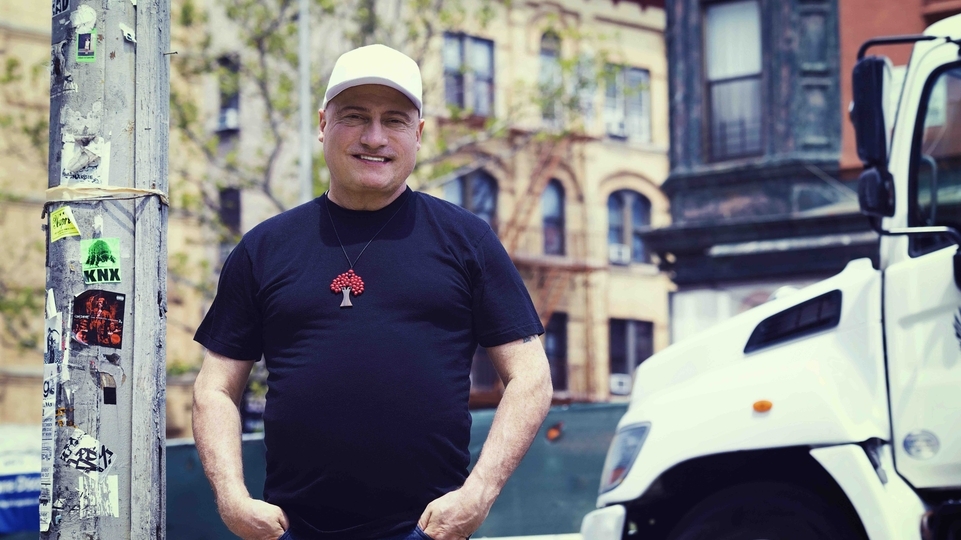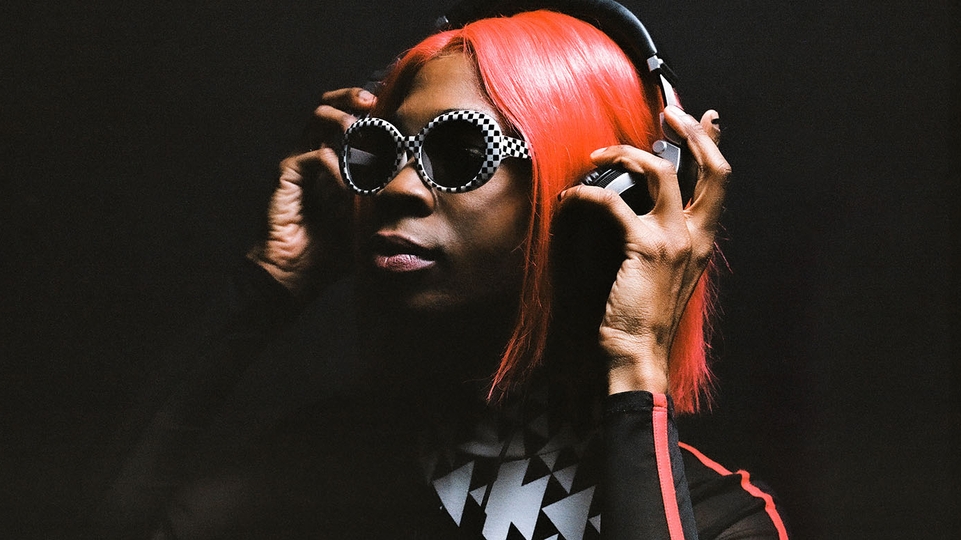.jpg?itok=MEceFxia)
Lauren Flax: intention is everything
After years of devotion to New York's club scene, Detroit-born Lauren Flax is more passionate than ever, with acid techno tracks to be perfected, causes to be fought, and lives to be saved through her harm reduction initiative. This month, she shares her journey with Bruce Tantum
It’s a Friday night at Brooklyn’s Public Records, and Lauren Flax is in her element. The dancefloor is packed, the room is dark, the fog machine is working overtime, and the sound is pristine — perfect for Flax’s crisp, lean, and propulsive selections. Stepping into the club’s DJ booth at 1am to take over from Elle Dee, who herself has laid down an impressively hard-charging set, Flax sets the tone with Trackman’s bleep-packed ‘Three’, cycling through diamond-cut tunes like P. J. Swerve’s churning ‘Gimme Mo’, the late Paul Johnson’s stripped-down ‘Who’s Psy is This’, and Mark Forshaw’s ping-ponging ‘Brexciya’.
It’s music that blends machine-tooled refinement with pure body-rock abandon. The party’s taking place at the start of Gay Pride Weekend, just two days before the big NYC Pride March and all its attendant revelry, and the crowd is in a festive mood. From the looks of it, Flax is as well: sporting a grey cut-off T-shirt, pigtailed hair tucked under a baseball cap bearing the logo of the Minneapolis art-and-culture crew Acme Collective, she’s fixated on the job at hand — but as she jacks along with the tunes, there’s seemingly an added edge of joy. And that’s how it should be, and not just thanks to Pride. A week ago, she had learned that she was crowned 2022’s Underground Hero in DJ Mag’s Best of North America Awards, beating DJ Bone, DJ Deeon, DJ Minx, and Tim Sweeney for the top spot.
Mere hours earlier, the mood — not only for Flax, but for much of America — was decidedly less celebratory. It’s lunchtime on June 24th, and the Supreme Court has just officially reversed Roe v. Wade, declaring that the constitutional right to abortion, upheld for almost a half century, no longer exists. Sitting in the back garden of a Williamsburg café, with shining sun and chirping birds giving the day a deceptively cheery feel, she’s doing her best to take the news in semi-stride. “It hasn’t fully sunk in yet, but I’m not shocked by it,” Flax, who has a strong streak of activism running through her, says. “Obviously, a lot of us are gonna be upset, but I’m not on the ground, crying my eyes out. We’re not going to be taken out. We’re going to be fighting back. I’m ready today, immediately, to put my feet to the pavement.”
It’s a struggle that Flax has been concerned with for a while now, thanks in part to her good friend Viva Ruiz. In 2015, Ruiz, the activist and artist (she was once a core member, along with Gavilán Rayna Russom, in the Crystal Ark) founded Thank God For Abortion, a campaign working to eliminate the criminalising stigma around abortion — “one T-shirt, one installation, one party, one rally, one conversation, one soul at a time”, as its mission statement puts it. “Now that Roe’s been officially overturned, Viva’s the person I’ll turn to when I need to join a protest,” Flax says. “She leads us in a way that pulls the community together, using music and of course chanting. Yes, what we are protesting is dark, old, and barbaric, but she manages to help us have fun while doing it. I’ve never protested this way in the past and it really helps keep morale up so we don’t pay with our own mental health. We’re allowed to smile and dance as we try to dismantle the fucking patriarchy.”
Abortion is far from the only issue that Flax is concerned with. There’s LGBTQ+ rights, for instance: Flax cites the late Edie Windsor, whose landmark case led to same-sex couples gaining marriage equality, as an inspiration. (“And it just feels like the work that people like her have done is now in jeopardy,” she worries.) There are issues of broader civil rights as well. During the summer of Black Lives Matter action, for instance, she was out daily to aid in the effort. “I was always leaving my house with a phone number written in marker on my leg, fully expecting to be arrested,” she recalls.
But the cause she’s undoubtedly most identified with is opioid-related harm reduction. In 2019, she co-founded Last Night A Deejay Saved My Life, an organisation that’s provided overdose response training to the nightlife community, including the use of naloxone, the lifesaving drug that counteracts the effects of overdose — much more on that later. It’s not a stretch to say that Flax really is a hero, in the literal sense as well as the metaphorical. But it’s her life in music that got her here, one that started in her hometown of Detroit.

Flax’s younger years were spent in Detroit’s East Side, attending Catholic school at Six Mile Road and Gratiot Avenue. (“It was so totally gnarly over there,” she says.) A 2017 piece about Flax on the Posture Media website states that “when she was very young she was sure she’d grow up to become a nun.” “That was kind of a joke,” she confesses. “But I was very indoctrinated from a young age — groomed, I even feel like saying — into believing in Jesus Christ and heaven and hell. When it’s shoved down your throat, it fundamentally gets entangled in your whole being.”
The family wasn’t so religious that music was taboo, though, and she can recall her father being into typical dad groups, like Foreigner and Journey — “pretty cheesy music”, as she describes it. After a move to the Detroit suburb of Sterling Heights in fourth grade, Flax started attending public school. “I was taken out of everything I knew,” she says. “ I started smoking, and then started skipping school, becoming bad.” Still, her parents saw fit to indulge young Flax’s rock-star dreams with drum lessons. “I was playing ‘Cherry Pie’ and Black Crowes, that kind of stuff,” she says. “Learning to play that kind of music was really fun.” She didn’t have her own set, though, sparing her folks hours of thumping kicks and thwacking snares. But I was pretty good, and finally I did ask for a drum kit,” Flax says. “But I also played basketball, which was everything to me. When I asked them for drums, they said, ‘Okay, well, we’ll get you a drum kit, but you have to quit basketball and you have to join school band.’ It wasn’t until way later on in life, that I realised that hey, they manipulated me. They probably regret that now,” she adds with a laugh.
Though her drumming days are in the past (unless you count the MPC as a drum kit), Flax credits the experience with helping her to understand rhythm more fully than most kids, something she feels has helped to guide her later career. “1,000%,” she says. “It definitely set the tone for understanding timing, and has really helped me with DJing.” Flax was falling in love with bands like Primus and Pearl Jam — by high school, it was Garbage and Hole. She eventually added guitar and bass to her musical repertoire. “But I was also into stuff like Ministry and Front 242,” she says. “Industrial was probably my first foray into electronic music.”

“I fought DJing, because everybody in Detroit was a DJ. And I was sitting there with my guitar playing Jewel, finger picking, like, ‘I’m just gonna stay me!’”
She was also discovering her sexuality. “It was the ninth grade, when I was around 13,” Flax recalls. “I got my first girl crush. I said to myself, ‘Okay, this is going to be the only one’, but that’s when I started figuring out that I was gay. Of course, by my senior year, I was so deeply in the closet and suffering so badly — what a lot of people suffer from when they’re in the closet are suicidal ideations and panic attacks, and that took me out. Everything became very dark for me, because I believed the teachings and I believed my family. I mean, when you’re a kid, you believe your parents, right? I never went to school. My only escape was going home and going to sleep. I don’t know how I graduated.”
Flax didn’t come out to her parents until right after high school. “And of course, that’s when I moved out of my house,” she says. “It was like my relationship with my family was over at that point, and it was the best thing that could have ever happened to me. I moved to Hamtramck in Detroit, into my first apartment — and I found myself.” At one point she found herself delivering pizza to pay the rent. At another, she worked at the vintage clothing and record shop Detroit Threads. She also got a job at Motor Lounge, which in the latter half of the ’90s served as a major hub of the city’s electronic music scene. Flax would later become a resident spinner there — but at the time, she was toiling as a beer-tub girl. At that point, she had little desire to try her hand at the DJing arts, let alone make a career out of it.
“I fought DJing,” she says, “because everybody in Detroit was a DJ, And I was sitting there with my guitar playing Jewel, finger picking, like, ‘I’m just gonna stay me!’ I was very adamant that I wasn’t going to do what everybody was doing — as if what I was doing was very original at the time, anyway.” But fate has a way of intervening. A good friend of Flax, Ian Lowell, had a pair of belt-drive Gemini turntables, the kind with little round knobs for the pitch control, sitting on his carpet. “Ian and I were actually just talking about this,” Flax says. “He’s like, ‘Do you remember when you came over to my house and sat down, and you put two records on — after I had been doing this for months and months, and hadn’t quite gotten it yet — and you played those two records, and everybody got quiet, and you just fucking got it.’
“At that moment, I just felt it,” she continues. “That was it. I got it — I can create something new out of things that exist already. Before then, I just didn’t get how life-changing and how joyful DJing was, to have the ability to create an environment like that. So yeah, I was hooked.”
It was only three months later when she got a call from Adriel Thornton, who was promoting a Tuesday night party at the club called Family. Derek Plaslaiko, Mike Servito and Jason Kendig were the main room DJs, while Flax was in the side room, spinning jungle — “lots of Amen breaks and pitched snares”, she recalls. Whatever the style, in a town where DJing is such a huge part of the culture, it must have been daunting to be a young spinner with a relatively high-profile gig right out of the gate. “Yeah, it was,” she agrees. “But it’s why I’m so grateful to come from that place and that era. Because that’s how it was. That’s how I came into it. You couldn’t be a fuck-up DJ in Detroit. People notice — people there, they have ears that can tell. They know.” But she had dreams beyond DJing — by that time, she was also taking classes at the Recording Institute of Detroit.
It wasn’t long before Flax revamped her spinning style, trading in her love of revved-up breakbeats for the joys of house, techno, and electro. The catalyst was a 1999 move to the birthplace of house, Chicago. “I remember telling myself that I had to live in a functioning city,” she says. “I wanted to live somewhere that has a mass transit system, somewhere that I could hail a cab and can just go somewhere.” She got a job at a pro audio shop called Midwest Stereo, within walking distance of the city’s famed Gramophone records, adding more ammunition to her arsenal of tunes. “I was DJing consistently throughout my time in Chicago,” she says. “I used to throw a party called Femme Fatale at BigWig, which would be all women, like DJ Heather and DJ Colette. All the homies would come through and play.”
It was while Flax was living in Chicago that she got what was, at that point, the highest profile gig of her nascent career — in 2000, she was tapped to play a slot at the debut Detroit Electronic Music Festival (nowadays known as Movement). At the time, Flax was friends with Carl Craig, who was one of the curators that first year, and his then-wife Hannah Sawtell; she informed them that she was coming back to town to check it out and give support. “I said, ‘Carl, I’m coming back for the festival. I’m so excited for this,’” she recalls. “And he was like, ‘Lauren, you are playing the festival!’ I was like, ‘Okay, yes, I’ll do it!’” If only life was always so simple. “It was super special, because no one knew what to expect,” she continues. “It was such a great vibe, just super magical with all these people gathering in Hart Plaza. This had never happened before, and everybody was down for it. We had such a good time.” She pauses, then adds, “That’s the only time my parents have seen me DJ.” Life was humming along in the Windy City, but Flax had her eyes on bigger things.

“Chicago was great, but Chicago is kind of a small town,” she explains. “Moving there was like a baby step.” She relocated only months after 9/11, when one could briefly find deals (by NYC standards, at least) on rent. “I managed to get a two bedroom on the Lower East Side for $1,550,” she says. “I lived there for four years. But by the time I moved out, it was up to $2,100, and that’s when I ended up moving to Bushwick.” That’s her neighbourhood to this day.
Flax was spinning in her new town as much as she could — she mentions Alex English, a longtime NYC DJ and promoter, booking her to play the long defunct Filter 14, a very small, very fun club in the not-yet-fully-gentrified Meatpacking District. “Way back in the day when it still smelled like rotting meat — the glory years,” she laughs. But even though she was playing out, she wasn’t fitting in. At the time, the predominant sound in New York was closer to the dance-rock end of the club music spectrum than anything she was accustomed to, with bands like the Rapture and !!! in full steam. Flax, coming from Detroit, had little grounding in the sound.
“The rock type stuff that DJs were playing — I had no problem with it, but it just wasn’t club music to me,” she says. “I mean, it made people dance, but it just wasn’t me. It was a very MisShapes kind of crowd,” she adds, referring to the scenester party-makers and DJs who helped to define NYC nightlife in the mid ’00s, “and that crowd didn’t really give a shit and understand the culture. That threw me off for a long time.” A gig spinning at the Jane Hotel in the West Village was the night when her predicament came to a head. “I would just DJ whatever, whenever — until that night, which was probably the lowest point of my career,” she says. “Not because of the place, per se, but it was this ballroom with people I didn’t relate to. It just kind of hit me that I had been doing this for so long, and this was now where I was at.”
Others might have considered giving up the decks for a sensible career, but Flax used that nadir to spur her to action. “I realised that I hadn’t given as much time and care to DJing as I should have,” she confesses. “Up to that point, I basically thought it was just so easy — in Detroit and Chicago, people just got it — but I realised that I needed to work a lot harder at this. I needed to start honing in on my exact sound, and on taking it a lot more seriously.”
Flax had been experimenting with making her own music since her Recording Institute of Detroit days, and had begun picking up pieces of gear while living in Chicago. The first of her productions to see the light of day was the Flaxdalass remix of Le Tigre’s ‘Much Finer’, released in 2001. (Give it a listen below if you want to hear just how far Flax’s sound has evolved since then.) It was later in the decade when her music really started to become interesting. In 2007, she joined forces with Lauren Dillard to form CREEP; not long after, she released her solo debut, the earworm vocal house cut ‘You’ve Changed’.
Pop fans know ‘You’ve Changed’ as the lead single from Sia’s 2010 album ‘We Are Born’. But when the original version — credited to “Lauren Flax Featuring Sia” and released on Alexander Technique’s DJs Are Not Rockstars label in 2009 — came out, Sia was a known entity, but not yet the global superstar she was soon to become. “Sia had been dating [Le Tigre’s] JD Samson at the time, and we became friends that way,” Flax says. “She’s someone that’s a genuine person, and she really stood up for me in the music industry. When she ended up covering it for her album, she made sure I got the same splits on that,” she adds, referring to how the song credits, and thus the dollars, are divvied up. “The powers that be didn’t want to do that, and she stood up for me, and I’m forever grateful.”
CREEP is a harder musical entity to pin down. Its sometimes-haunting sound was often categorised as trip-hop — but it’s trip-hop with a New York swagger, a dose of clubland thump, and a glaze of experimentation and general weirdness. “It was meant as a side project,” Flax says. “I was so devoted to and entrenched in the dance community and trying to build up what I was doing in that world, but I wanted to also have an outlet that had no boundaries, in terms of beats or expectations, so me and Lauren started messing around. We ended up writing this song called ‘Jessica King’. We wrote it because we saw this video of this teenage girl in the UK somewhere, and she was flipping her hair around in reverse, and we’re like, ‘This is amazing! This is incredible!’ So we wrote a song, and we created a video of me flipping my big hair with the CREEP logo behind it. We put it out on the internet, and it got traction, which was a surprise. People were paying attention — we were like, ‘Okay, this is interesting.’”
Seeking to build on the momentum, the duo wrote a song called ‘Days’ and recruited their friend Romy Madley-Croft — otherwise known as Romy of The xx — to lay down the vocals. “She came over to my house and asked us to leave my bedroom so that she could sing the vocals for ‘Days’ because she’s so shy and so sweet,” Flax recalls. They finished off the song, and Flax played it for yet another high-profile friend, Warren Fischer of the performance project/traveling circus Fischerspooner, who also had (and still has) a film/production studio.
“Warren said, ‘I want to make a video for this, and I’m gonna pay for it, because I need to just have a creative outlet,’ because he was doing car commercials or whatever, and he’s such a creative genius. The universe really lined it up for us, and it was great.” ‘Days’, and Fischer’s video, were released in late 2010. “And BBC Radio 1 had it as their hottest record of the week,” Flax says with a touch of amazement. That kind of solidified that we were a band, that we were a real thing, and we needed to write more music. And that’s exactly what we did.” She also spent a few years as the tour DJ for Fischerspooner, and continued to release solo work and remixes.
CREEP’s LP, ‘Echoes’, didn’t see the light of day until 2013. That delay was partially due to the fact that it was an intensely collaborative album, with 14 different vocalists — a rather mind-blowing list that takes in artists ranging from Tricky to Lamb’s Lou Rhodes, Planningtorock, Nina Sky, and Miike Snow’s Andrew Wyatt, among other notables. But there were also issues on the management end of things that delayed the release.
 (1).jpg.webp?itok=UT2nAjTb)
“At that point in my life, my bullshit meter was very acute — and I knew the people in my life from then on were going to be genuine.”
Flax can’t divulge the details (though the word “shady” comes up once or twice), but the results were devastating. CREEP ended up losing their booking agency, and after years of working on ‘Echoes’, Flax and Dillard were unable to support it when it was finally released. “So it all ended, after three years of working on this record,” Flax says. “I went into a pretty dark depression for about a year-and-a-half, akin to my senior year of high school.” CREEP was history. Some would have quit music entirely, but eventually, the experience led to growth. Flax decided to start over. “And at that point in my life,” she says, “my bullshit meter was very acute — and I knew the people in my life from then on were going to be genuine.”
Another change: by 2016, Flax had switched up her production technique, foregoing her laptop-based methodology to work with hardware. “I learned the difference of writing music in the box from actually having tactile things to play with and perform on,” she explains. “That changed everything for me. You can hear the switch. You can hear the energy that’s going into the music, because I’m hitting RECORD and I’m playing and having fun and dancing while I’m doing it — and that’s how the music shifted.” In the early summer of 2018, Flax released the ‘Dance Trax Vol. 16’ EP on the UK label Unknown To The Unknown. The lead track was called ‘It’s Ours’ — but the other cuts are called ‘Your Mom Likes Flange’, ‘Acid Ghetto’, and ‘Sequenc_tial Discord’, which give you a rough idea of their sound.
“This was the new style that I’ve discovered is my real style — that jackin’ techno sound,” she says. “The particular jackin’ sound that I’m drawn to is definitely the merging of the Midwest as a whole. The elements I really love are those 808 drum sounds with a short decay and a touch of swing,” she adds, citing Posthuman as a duo that has that technique down. “I think the short decay is what makes it jackin’.” Flax’s new style was cemented the following spring when she released the ‘One Man’s House Is Another Woman’s Techno’ EP on The Bunker New York, the longstanding label and party crew that’s been a guiding light of the NYC techno community since the early ’00s.
Since then, she’s been a member of the extended Bunker family and the affiliated Beyond Booking agency, which has something of a full-circle feel to it — Mike Servito and Derek Plaslaiko, two of Flax’s comrades from her Motor Lounge days, are longtime Bunker residents. “Those are people who I look up to immensely, and it’s been hard to not have impostor syndrome around them when it comes to DJing,” she confides. “So in the beginning, it was scary, because I just have so much respect for them and everybody involved with the Bunker. It’s been the most mutually beneficial, wonderful relationship, because it’s hard to find such down-to-earth, grounded people that are actually fun to work with,” by implication contrasting the Bunker with CREEP’s old management.

Flax’s involvement with the Bunker also spurred her to perform live again, something she hadn’t done since the CREEP days. Bryan Kasenic, who founded and runs the Bunker, wanted to book Flax for a live set at Brooklyn club Elsewhere; Flax demurred, citing the lack of a piece of key gear. “I was like, ‘Look, I want to do this, but I don’t have a drum machine,’” she recalls. “He said, ‘Look, I’m gonna pay you upfront for the gig, go buy a drum machine, do this.’” She started touring with her hardware setup throughout 2018, right up till the start of the pandemic — currently the live set is on hold in favour of DJing, while she masters the beast known as the Elektron Octatrack. “The Octatrack is the most in-depth piece of gear, that people are often very scared of, because it’s just a very deep machine,” she says. “And I’ve been scared of it forever. But I finally bought one, and once I’ve learned that piece of gear is when I’m going to do live again.”
In the wake of far too many accidental opioid overdoses — often due to drugs cut with fentanyl — in nightlife and beyond, Flax cofounded Last Night A Deejay Saved My Life in late 2019. It was a project borne of frustration. “I’ve been surrounded by addiction, with people I care about, but before Last Night A Deejay Saved My Life, I’d always felt sort of helpless in that realm,” she admits. “But the catalyst that made me step up was the changing of the law on naloxone, so that you don’t need a prescription to have it anymore. But it’s 140 bucks a pop. That’s cost prohibitive, so I had to think of where to go from there.”
Flax got in touch with her friend Danielle Pickering, a nurse with LGBTQ+ health provider Callen-Lorde; the two then partnered with Dr. Julius Johnson from the National Black Nurses Association. “Dr. JJ can provide naloxone for free, and we can train people and give them these little blue cards, which means they’ll never have to go get trained again, and they can continue to get naloxone for free,” she says. “I was like, ‘This is perfect. Let’s do pop-ups, let’s get people involved, let’s go to clubs, let’s open this up to the public.’”
In addition to literally saving lives, the ongoing program has certainly raised public awareness of the issue, especially within nightlife. “I’m not the first to do this, obviously,” she says. “But it is good to see a lot of other harm reduction groups that have come up, and it seems like a normal thing to talk about now, instead of it being so taboo.”
.jpg.webp?itok=J4FegRa5)
The desire to help others, and to be productive — part of something bigger than yourself — is in large part what drives Flax. “I’m just so big on focusing on the community as a whole, and checking my privilege, and remembering why I get to do what I do — as a white person who is in this business — off of the creativity and heart and passion of queer Black individuals.”
That attitude extends far beyond Flax’s musical life. “Even in this moment today, I’m thinking about what we’ve learned over the past couple of years, and how sometimes music takes a backseat,” she says. “2020 is a perfect example of that. I didn’t write a single fucking song in 2020, and I didn’t beat myself up for it. I knew that the anger had to be channeled in a different way. The anger had to channel through activism in the street. And I know that’s not the last time that’s gonna happen. And then today, Roe versus Wade is returned, and I am ready to do what I need to do. And if music has to take a backseat again, so be it.”
But at the moment, music is very much behind the wheel. For now, she’s focused on perfecting her jackin’ techno style, on diving down into her music’s core essence. “It’s only now, within the last three or four years, I’ve been starting to merge everything into something I feel is cohesive,” Flax says. “I’m getting there, but I’m not there quite yet. It might not come until I’m 50, but that’s okay. I think it’s important to lay out the concept of relying on yourself and your authenticity to get you there.
“I think intention is everything,” she continues, “and if your intention is to get rich and famous, then you’re putting yourself on track for a not very exciting ride. But if your intention is to do what makes you happy, and to learn and grow, and to hopefully have other people grow from what you’re doing, or at least enjoy what you’re doing, the rest is going to line up for you.” For Flax, this year’s Underground Hero, the path is clear.





